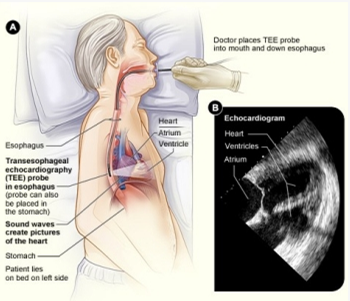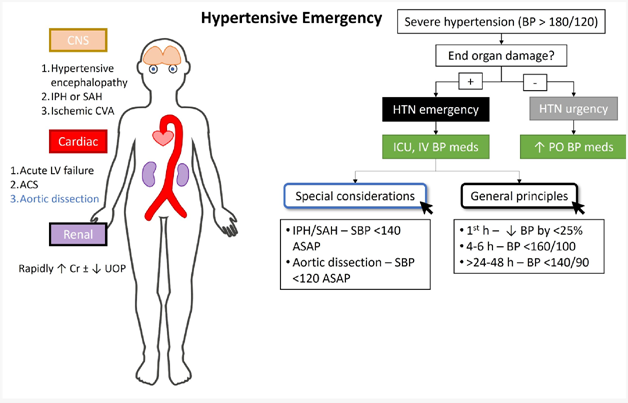A nurse is preparing a client for scheduled transesophageal echocardiography. Which action should the nurse perform?
Instruct the client to drink 1 L of water before the test.
Administer intravenous (IV) benzodiazepines and opioids.
Inform the client that the client will remain on bed rest following the procedure
Inform the client that an access line will be initiated in the femoral artery.
The Correct Answer is D
Transesophageal echocardiography is a diagnostic procedure that involves inserting a probe into the esophagus to obtain detailed images of the heart. In some cases, an access line may be initiated in the femoral artery to monitor blood pressure during the procedure and administer medications if needed. Informing the client about this aspect of the procedure helps ensure that they are aware of what to expect and can provide informed consent.

Let's go through the other options and explain why they are not the most appropriate actions:
Instruct the client to drink 1 L of water before the test: This action is not necessary for transesophageal echocardiography. Drinking water before the test is typically done for certain abdominal or pelvic ultrasound examinations to provide better visualization. However, for TEE, the probe is inserted into the esophagus, and drinking water is not required.
Administer intravenous (IV) benzodiazepines and opioids: The administration of intravenous benzodiazepines and opioids is not a routine part of preparing a client for TEE. The need for sedation or analgesia during the procedure would be determined based on the individual client's condition and level of discomfort.
Inform the client that the client will remain on bed rest following the procedure: While some post-procedure instructions may be given to the client, such as avoiding eating or drinking until the effects of sedation wear off, informing the client that they will remain on bed rest following the procedure is not a specific requirement for TEE. Post-procedure instructions can vary depending on the individual client's condition and the healthcare provider's recommendations.
Nursing Test Bank
Naxlex Comprehensive Predictor Exams
Related Questions
Correct Answer is D
Explanation
The client reports a headache with pain at level 5 of 10.: While a headache can be a symptom of high blood pressure, a pain level of 5 out of 10 alone does not indicate an immediate life-threatening condition. It is important to assess and manage the client's pain, but it may not be the most critical finding to report in this situation.
The client has epistaxis after blowing his nose several times. : Epistaxis, or a nosebleed, can occur due to high blood pressure, but it is not the most urgent or critical symptom in a hypertensive emergency. While it is essential to address the nosebleed and monitor blood pressure, other symptoms may indicate more severe consequences of uncontrolled high blood pressure.
The client has a urine output of 120 mL over 4 hours.: While decreased urine output can be a concerning sign, it is not the most significant finding to report in a hypertensive emergency. In this scenario, the focus is on acute complications related to high blood pressure, such as organ damage or impending stroke, which require immediate attention.
In summary, the finding that is most important to report to the healthcare provider in a client with a hypertensive emergency is the presence of new-onset blurry vision and facial asymmetry. These symptoms suggest potential neurological involvement and the need for urgent medical intervention to prevent serious complications like stroke.

Correct Answer is D
Explanation
Hypertension, or high blood pressure, is often referred to as the "silent killer" because it typically does not cause noticeable symptoms until it has already caused damage to target organs such as the heart, blood vessels, kidneys, or brain. It is crucial for the client to understand that even if they do not experience symptoms, untreated or poorly controlled hypertension can lead to serious complications, including heart disease, stroke, kidney problems, and more.
While dietary changes and increasing physical activity are important lifestyle modifications for managing hypertension, it is not accurate to state that most people can control their blood pressure through these measures alone. Hypertension is a complex condition influenced by multiple factors, and many individuals require additional interventions, such as medication, to effectively manage their blood pressure.
Annual blood pressure checks are indeed important to monitor the effectiveness of treatment and ensure that blood pressure remains within the target range. However, this information is secondary to the understanding that hypertension is typically asymptomatic until target organ damage occurs.
Recognizing the potential risks associated with untreated or uncontrolled hypertension can motivate the client to adhere to their treatment plan and make necessary lifestyle changes.
Whether you are a student looking to ace your exams or a practicing nurse seeking to enhance your expertise , our nursing education contents will empower you with the confidence and competence to make a difference in the lives of patients and become a respected leader in the healthcare field.
Visit Naxlex, invest in your future and unlock endless possibilities with our unparalleled nursing education contents today
Report Wrong Answer on the Current Question
Do you disagree with the answer? If yes, what is your expected answer? Explain.
Kindly be descriptive with the issue you are facing.
